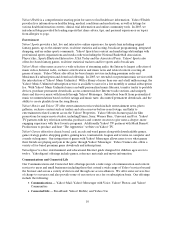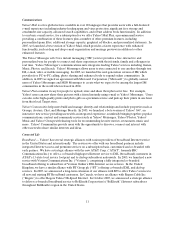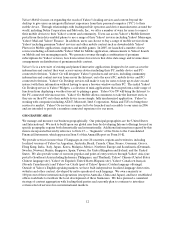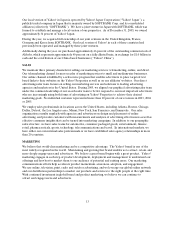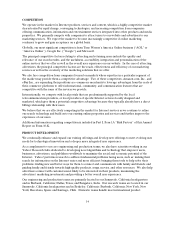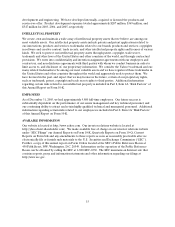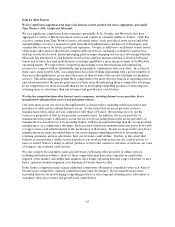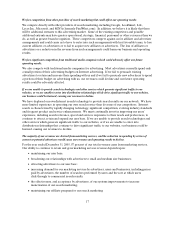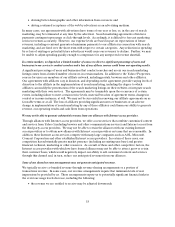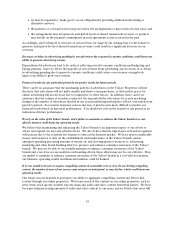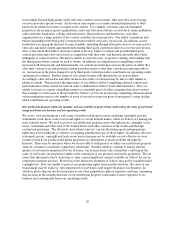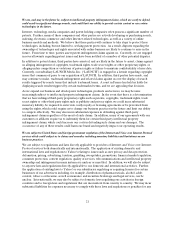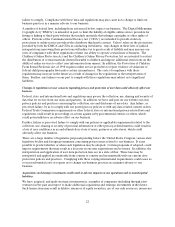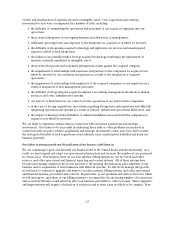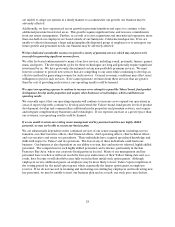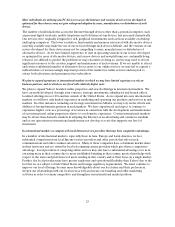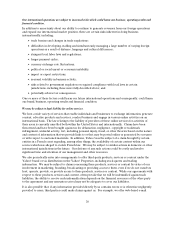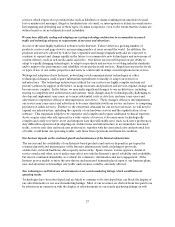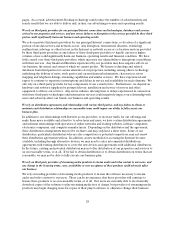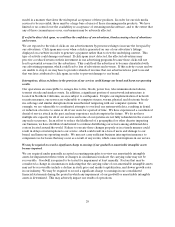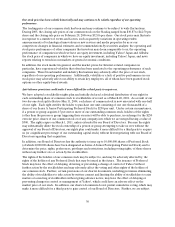Yahoo 2005 Annual Report Download - page 26
Download and view the complete annual report
Please find page 26 of the 2005 Yahoo annual report below. You can navigate through the pages in the report by either clicking on the pages listed below, or by using the keyword search tool below to find specific information within the annual report.20
increasingly demand high-quality audio and video content, such as music, film, speeches, news footage,
concerts and other special events. Such content may require us to make substantial payments to third
parties from whom we license or acquire such content. For example, our music and entertainment
properties rely on major sports organizations, radio and television stations, record labels, music publishers,
cable networks, businesses, colleges and universities, film producers and distributors, and other
organizations for a large portion of the content available on our properties. Our ability to maintain and
build relationships with third-party content providers will be critical to our success. In addition, as new
methods for accessing the Internet become available, including through alternative devices, we may need to
enter into amended content agreements with existing third-party content providers to cover the new devices.
Also, to the extent that Yahoo! develops content of its own, Yahoo!’s current and potential third-party
content providers may view our services as competitive with their own, and this may adversely affect their
willingness to contract with us. We may be unable to enter into new, or preserve existing, relationships with
the third parties whose content we seek to obtain. In addition, as competition for compelling content
increases both domestically and internationally, our content providers may increase the prices at which they
offer their content to us, and potential content providers may not offer their content on terms agreeable to
us. An increase in the prices charged to us by third-party content providers could harm our operating results
and financial condition. Further, many of our content licenses with third parties are non-exclusive.
Accordingly, other webcasters and other media such as radio or television may be able to offer similar or
identical content. This increases the importance of our ability to deliver compelling editorial content and
personalization of this content for users in order to differentiate Yahoo! from other businesses. If we are
unable to license or acquire compelling content at reasonable prices, if other companies broadcast content
that is similar to or the same as that provided by Yahoo!, or if we do not develop compelling editorial content
or personalization services, the number of users of our services may not grow as anticipated, or may decline,
which could harm our operating results.
Our intellectual property rights are valuable, and any inability to protect them could reduce the value of our brand
image and harm our business and our operating results.
We create, own and maintain a wide array of intellectual property assets, including copyrights, patents,
trademarks, trade dress, trade secrets and rights to certain domain names, which we believe are among our
most valuable assets. We seek to protect our intellectual property assets through patent, copyright, trade
secret, trademark and other laws of the United States and other countries of the world, and through
contractual provisions. The efforts we have taken to protect our intellectual property and proprietary
rights may not be sufficient or effective at stopping unauthorized use of those rights. In addition, effective
trademark, patent, copyright and trade secret protection may not be available or cost-effective in every
country in which our products and media properties are distributed or made available through the
Internet. There may be instances where we are not able to fully protect or utilize our intellectual property
assets in a manner to maximize competitive advantages. Further, while we attempt to ensure that the
quality of our brand is maintained by our licensees, our licensees may take actions that could impair the
value of our brand, our proprietary rights or the reputation of our products and media properties. We are
aware that third parties have, from time to time, copied significant content available on Yahoo! for use in
competitive Internet services. Protection of the distinctive elements of Yahoo! may not be available under
copyright law. If we are unable to protect our proprietary rights from unauthorized use, the value of our
brand image may be reduced. Any impairment of our brand could negatively impact our business. In
addition, protecting our intellectual property and other proprietary rights is expensive and time consuming.
Any increase in the unauthorized use of our intellectual property could make it more expensive to do
business and consequently harm our operating results.


